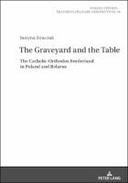Explore

The book is based on long-term ethnographic research in the Polish-Belarusian borderland. It examines the dynamics of symbolic boundaries between the Catholic and Orthodox believers in their everyday lives. By analyzing the space of local cemeteries, rituals, and attitudes related to death, eating practices, and food sharing, the author points to the changing sense of ethnic identity and the feeling of familiarity and otherness. Confessionally mixed neighborhoods and families enable different forms of religious bivalency and become a crucial factor in bridging and crossing ethnic boundaries. Socio-cultural norms and social relations shape the ethnic identity of the borderland’s residents more than the institutional frames of both churches.
This book is included in DOAB.
Why read this book? Have your say.
You must be logged in to comment.
Rights Information
Are you the author or publisher of this work? If so, you can claim it as yours by registering as an Unglue.it rights holder.Downloads
This work has been downloaded 79 times via unglue.it ebook links.
- 79 - pdf (CC BY-NC-ND) at Unglue.it.
Keywords
- anthropology
- Belarus
- borderland
- borderline
- Catholic
- death rituals
- Ethnic identity
- folk religiousness
- food practices
- Graveyard
- Orthodox
- peasant culture
- Poland
- Religious Diversity
- Social & cultural anthropology, ethnography
- Society & Social Sciences
- Sociology & anthropology
- Straczuk
- Table
- thema EDItEUR::J Society and Social Sciences::JH Sociology and anthropology::JHM Anthropology::JHMC Social and cultural anthropology
Links
DOI: 10.3726/b19019Editions

